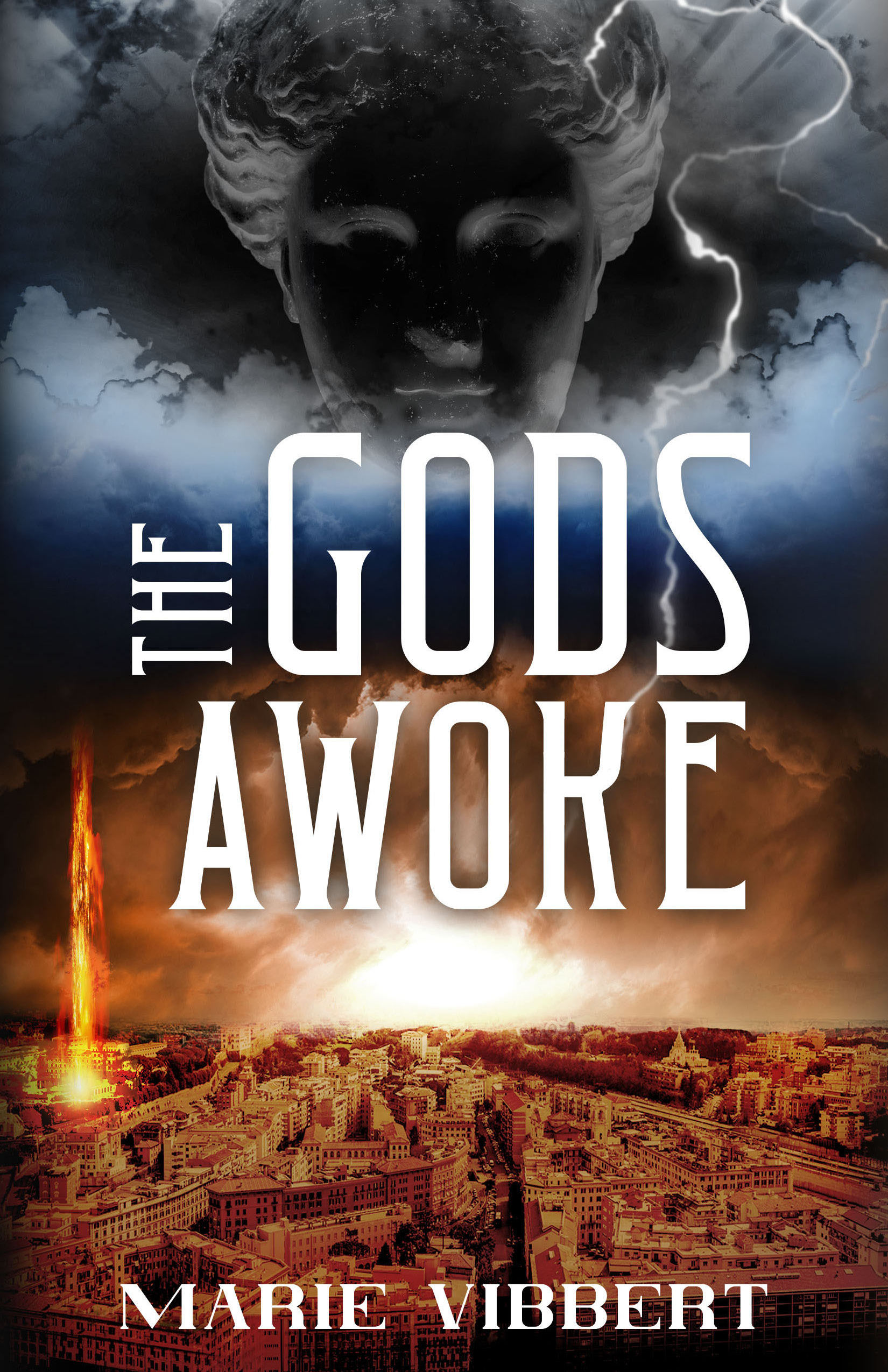
by Gideon Marcus
Mags or paperbacks?
The latest issue of Yandro has got a nice piece from Ted White reviewing the latest (and best?) tome on science fiction by Alexei Panshin. The best part of White's article is his gentle but lengthy disagreement over the status of magazines versus paperbacks. Both White and Panshin agree that the paperback novel format is The Next Big Thing (indeed, it's already here), but they disagreed on their role and prospects.
Panshin sees the science fiction digests as a continuation of the pulps, with all the negative connotations attached thereto. He thinks they will eventually die. White strongly disagrees. Firstly, he notes that pulp does not equal bad–many extremely talented authors got their start cranking out a half million words for the old mags. Indeed, White says magazines are now populated by a stable of established writers who have perfected their trade while the paperbacks, since they are a buyer's market, will publish anything. Essentially, the books have taken the role the magazines had in the glut days of the early '50s.
White goes on to say that paperbacks are great, but 1) mags are the main outlet for short stories, and some authors are just better at the short form, and 2) editors keep mags going for the love of it. This means they are likely to survive longer than purely economic considerations would suggest.
It's a good piece. I'd give it a read.
The issue at hand
Speaking of which, should you give the strikingly covered latest issue of Analog a read? Well, if you're one of the 30,000 subscribers who gets it delivered, sure go ahead. If you're eyeing it at a newsstand, you'll want to read further…
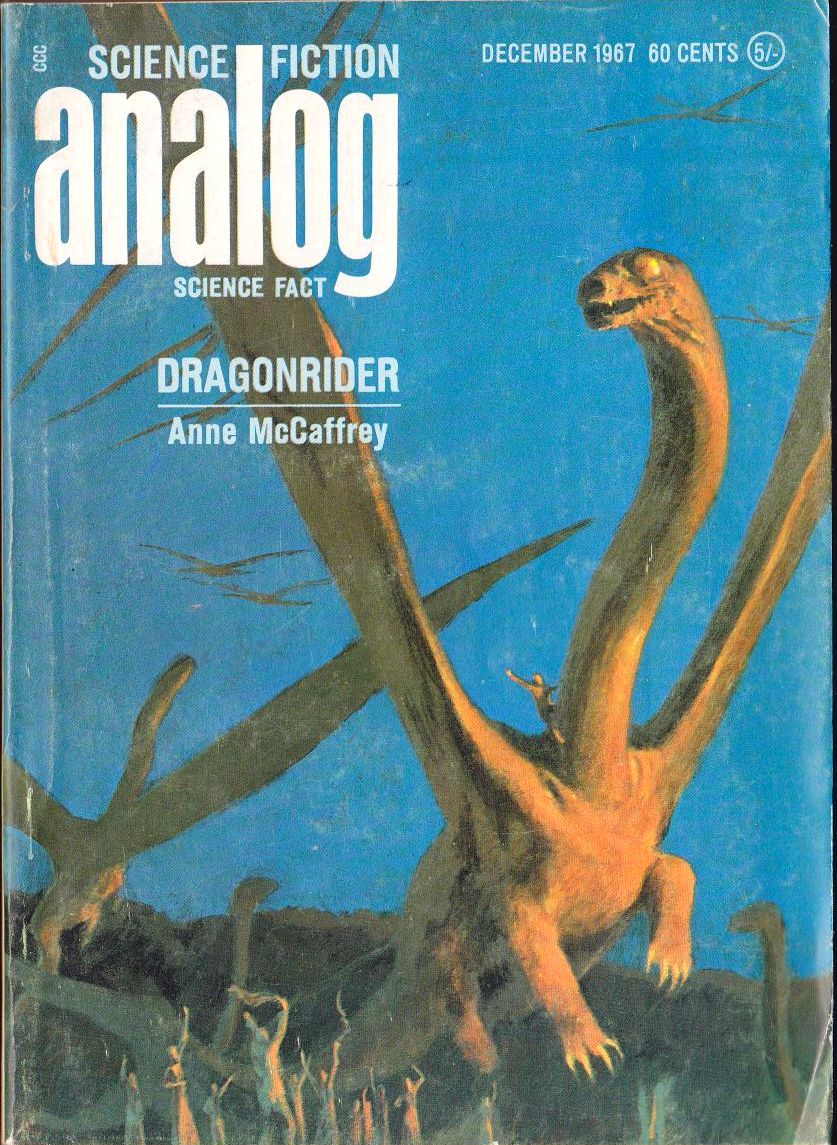
by John Schoenherr
Dragonrider (Part 1 of 2), by Anne McCaffrey
In Weyr Search, the first installment of this serial-in-all-but-name, we were introduced to planet Pern. It is a fraught former Earth colony, severed from its homeworld for thousands of years and ravaged periodically by rhizomic attacks from a nearby world. The only defense against the "threads" are fire breathing dragons ridden by telepathically connected humans.
The problem is it's been four centuries since the last attack and the "weyrs" of dragronriders have been allowed to go fallow. Only Benden Weyr is left, and it is woefully undermanned and underdragoned.
This latest installment in the saga of Pern opens up sometime after the last. Lessa, heir to the Hold of Ruatha and now Weyrlady by virtue of her communion with the dragon queen Ramoth, has shacked up with the F'lar, head of the dragonriders. Not because the two like each other, but because that's the law: Weyrladies and Weyrleaders must get hitched.
The thread has begun to fall, and the dragons are sorely taxed to meet the challenge, teleporting in and out of the frigid between to intercept the alien spores.
(Note: What do you call it when a dragon relieves itself between? An ICBM!)
Despite the perseverence of F'lar's crew, the thread has the upper hand–until Lessa accidentally discovers that dragons not only can teleport and telepath, but they can also time travel, too! (telechron?) As one might expect, this changes the whole equation…but maybe not for the better.
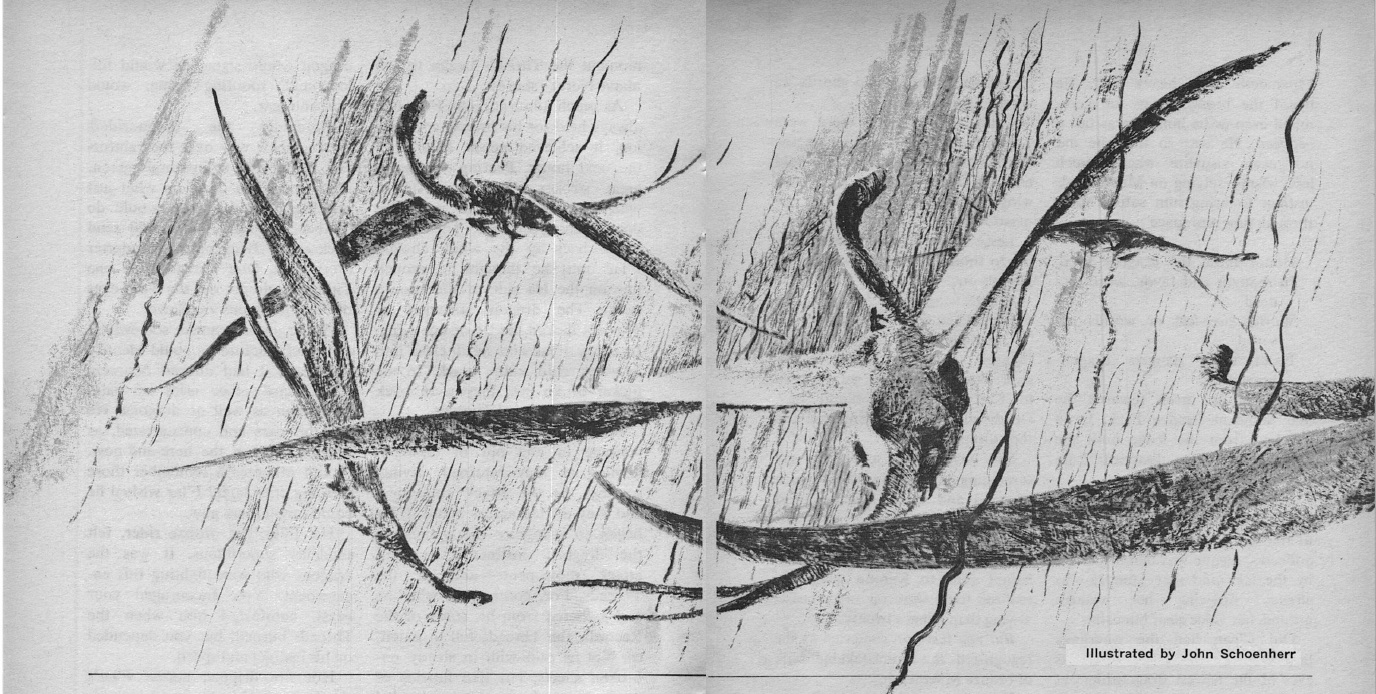
by John Schoenherr
I dunno. I was expecting a rousing Battle of Britain story, with never so much being owed by so many to so few. The thread would start gradually, the brave fighters would fight to their limits, and through ingenuity and tenacity, eventually win. The story would get extra points for being by and from the viewpoint of woman, a rare thing in science fiction, particularly in the mag that Campbell built.
Instead, the story is badly paced, lurching from scene to scene. There is no build-up to the thread strike, no mounting of tension; it is just suddenly upon them. McCaffrey throws psionic conceits against the wall to see which ones stick (Lessa not only discovers time travel, but she is the only one who can communicate with all of the dragons–unlike the other riders, who can only communicate with their bonded dragon).
Beyond that, the two main characters are thoroughly unlikeable, by turns yelling and sardonically sniping at each other. An element of violence suffuses their interactions, with F'lar and Lessa's couplings being referred to as not less than rape. It all feels very Marion Zimmer Bradley. I've said before that Lessa feels like a wish-fulfillment character for the author. This hypothesis is only becoming more concerning.
What's frustrating is I feel there could be an interesting story here in the hands of someone else. Jack Vance has already written a thematically similar tale with his The Dragon Masters. It's clear that Campbell wants Pern to be the next Dune, complete with striking Schoenherr covers. Thus far, I'd say McCaffrey isn't up to the task.
I was originally going to give the installment a bare three stars, but I think I've talked myself out of it.
Two stars.
The Destiny of Milton Gomrath, by Alexei Panshin
In this short short, an orphaned garbage collector spends his life convinced that his existence of drudgery is a mistake, and that someone, somehow, will rectify the mistake some day.
Turns out he's right, but that may not be a good thing.
This could be the start of a mildly entertaining Laumer novel. Instead, it ends right after the first punchline.
Blink and you'll miss it: three stars.
Whosawhatsa?, by Jack Wodhams
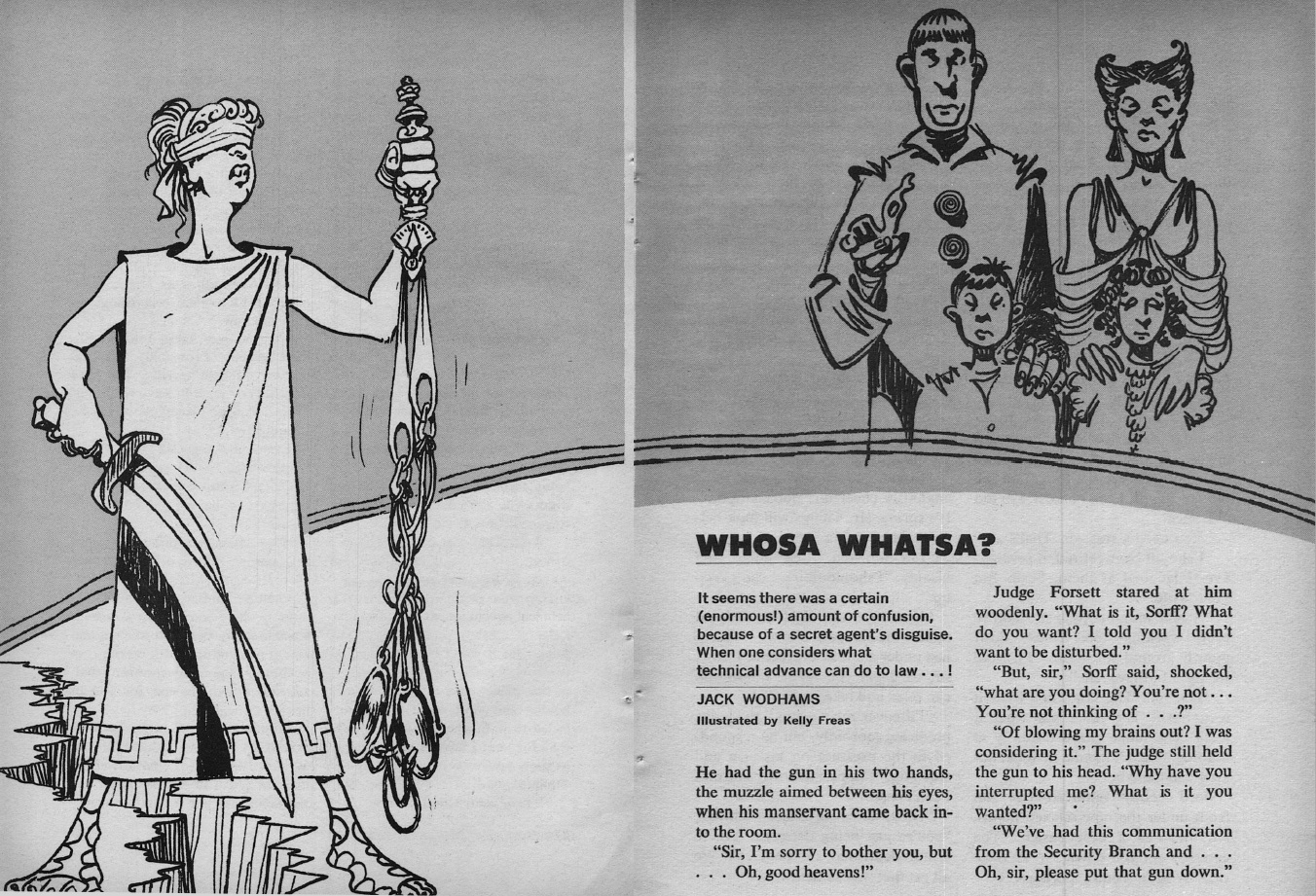
by Kelly Freas
Picture a world where a sex change is as complete and easy as an appendectomy…and reversible, to boot! Now picture the most complicated legal case possible involving a married couple seeking a divorce, both parties of which have swapped genders. And there are children involved, multiple paramours, probate issues, and a Strong Public Interest.
On the one hand, this story is a drag. The attempts to make it "funny", mostly consisting of endless scenes in which the judge assigned the case contemplates suicide rather than attempt presiding, are a flop. Also, one gets the feeling that if women's lib had advanced in the story as much as medical science, most of the legal issues and many of the social ones would be irrelevant. Particularly if 1) we could extend the legal rights currently afforded women in the federal government to all women, and 2) we could approach homosexuality with a less than medieval attitude.
That said…
There is very interesting exploration of what it means to change genders and the motivations that underly the desire to make such a transition. While the situation is made as ludicrous as possible, the subjects, for the most part, are taken seriously. I actually found the piece remarkably progressive, especially for Analog. Certainly, I've never read anything like it before.
Three stars.
Beak by Beak, by Piers Anthony
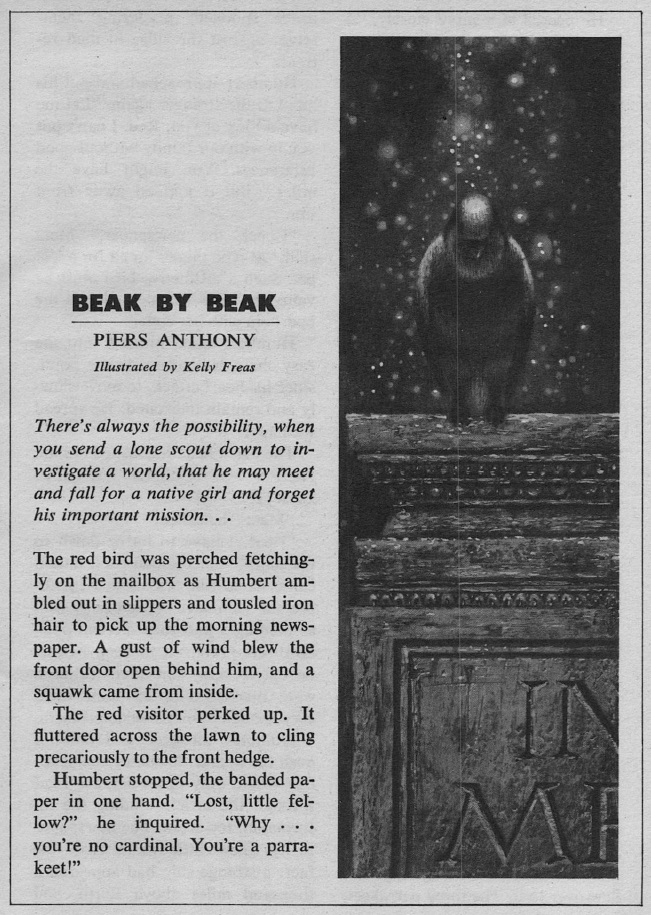
by Kelly Freas
An alien spacecraft orbits the Earth, neither communicating nor responding to communications. Meanwhile, a red parrakeet arrives at the home of a bird-keeper and joins his avian pet family for a time.
This is a pleasant pastoral piece that tries a little too hard to get its message across. Still, I'll read something like this a thousand times before I'll read Chthon again.
Three stars.
Venus and Mercury—Locked Planets? by R. S. Richardson
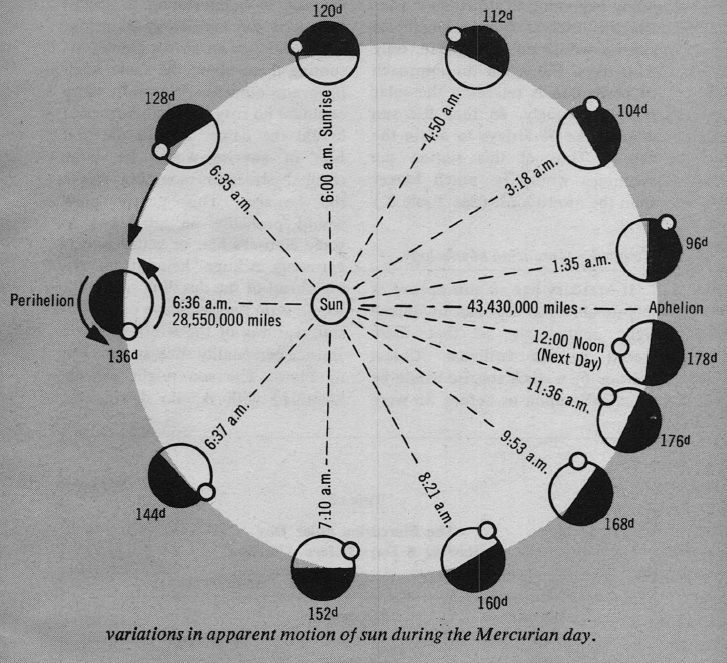
Dr. Richardson writes so-so science fiction, but I generally quite like his science fact articles. This one talks about the newly discovered rotation rates of Venus and Mercury, as well as what they might mean in relation to the history of the solar system.
On the one hand, I learned a bit, and that's significant given that I know a lot of astronomy. On the other, I felt the pictures were worth a thousand words, and I found myself skimming a lot of the text. In other words, maybe 20 pages wasn't necessary to make the point (God help us–next month's science article will be 10,000 words!).
Still, four stars.
A Question of Attitude, by Christopher Anvil
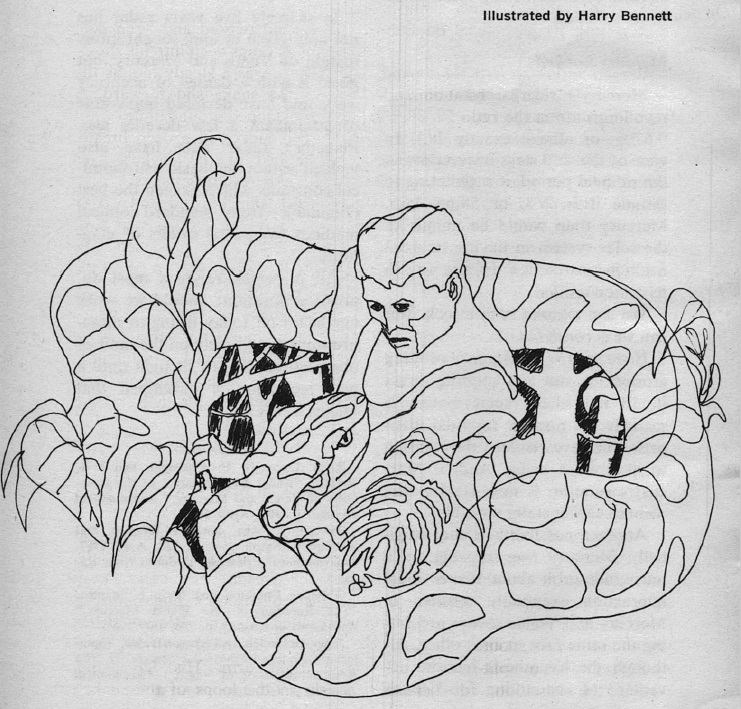
by Kelly Freas
A recruit for the interstellar patrol finds himself in an increasingly difficult series of imaginary tests, ones that stick him in mortal peril in a simulated alien planet environment. He seems to fail each one, ending up "dead", yet the Lt. Colonel in charge of training seems to think he has promise.
Normally, Anvil and Campbell are a toxic combination. This time around, the story is kind of interesting. I also rather enjoyed the nihilistic suggestion that the recruit's success is measured in the degree of his failure, and also that passing the tests only means his life is about to get worse. It fits with the whole zeitgeist of our current engagement in Vietnam. Even if Joseph Heller did it better.
Three stars.
Psi Assassin, by Mack Reynolds
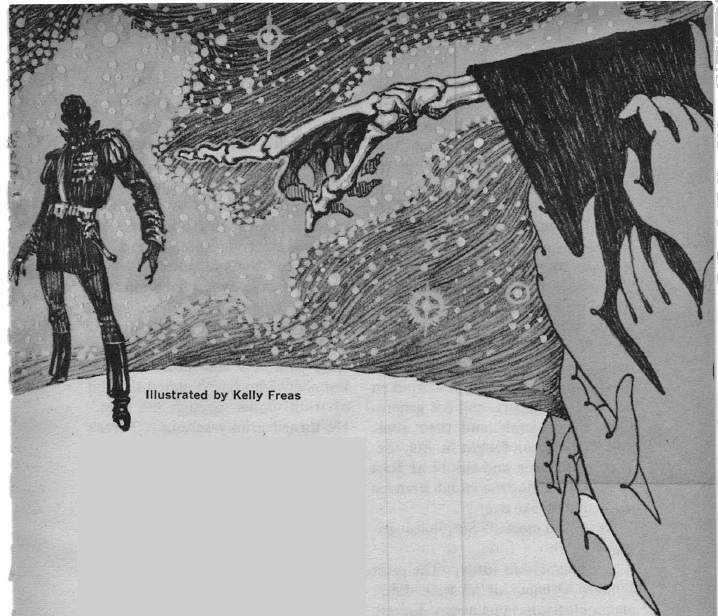
by Kelly Freas
Lastly, yet another of Reynolds' tales of Section G, the interstellar agency whose job is to make sure no human planet ends up too backwards, lest the race become prey to an ominous but yet unmet alien menace. This time, a psionic assassin is sent to kill the head of a Latin dictatorship. The problem: agent Ronny Bronston has already dispatched said leader and taken his identity!
We have all the hallmarks of a Reynolds Section G story: endless historical lectures (that never seem to have any object lessons beyond the mid-20th Century), flippant personalities that leach the story of any gravitas, the lone female agent (Reynolds never lets us forget her sex), and a happy ending.
Reynolds has done decent work with this series, but less often than not.
Two stars.
Doing the math

So who's right? Alex or Ted? Based on this month, I'd give the nod to Ted. While Analog was on the mediocre side, managing just 2.8 stars, other magazines fared much better. Both Galaxy and New Worlds scored 3.2 stars. Fantasy and Science Fiction was also pretty good (3.1). If was a bit tired, but par for the course (2.8), and while Amazing's 2.7 score puts it at the bottom of the pack, it actually is on an upward trend.
You could fill two magazines with all the superior stuff that came out this month, which is a good crop. Sadly, McCaffrey wrote the only woman-penned piece, and it wasn't very good (though it was better than Poul Anderson's novella in Galaxy).
I give magazines at least a few more years…
But that's not all we have for today. All the way from Australia comes this exciting stop press in the world of space news!:

by Kaye Dee
“Australia Joins the Space Club!”
Although Australia has supported American and British/European space efforts over the past decade, just yesterday, on 29 November we finally gained our own membership of the Space Club by placing our first satellite, WRESAT-1, into orbit. I’ve written articles previously about the first satellites of France and Italy, so it gives me great pride to report on Australia’s own satellite launch.
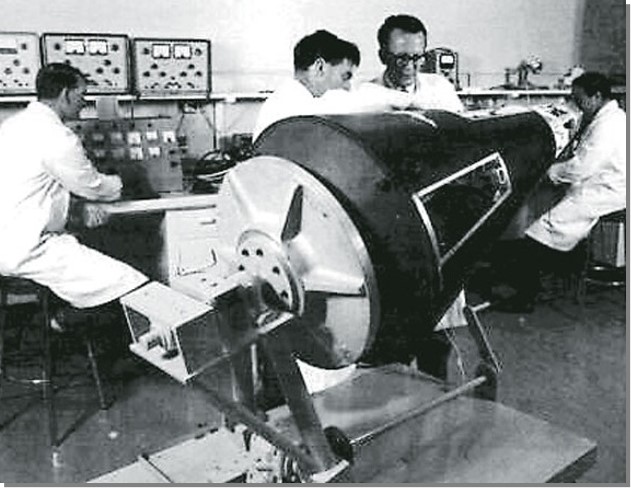
WRESAT-1 under construction in at the WRE
WRESAT-1 (WRE Satellite) has been a joint project of the Weapons Research Establishment (WRE) and the University of Adelaide, with significant support from the United States. In 1966, the Advanced Research Projects Agency (ARPA) offered Australia a spare Redstone rocket from the ARPA-led Project Sparta programme at Woomera as a satellite launcher. Sparta has been the final phase of a US/UK/Australian re-entry physics research programme commenced in 1960, investigating radar-echo phenomena created by re-entering missile warheads. The Sparta team even offered to prepare and fire the Redstone for the WRE.
“A Rush Job!”
The scientists and engineers involved in the Australian upper atmosphere research programme took advantage of the proposal to move their instruments from sounding rockets to satellite. However, the Sparta launch offer placed the satellite project on a very tight schedule, as the spacecraft would have to be ready for launch by the end of 1967, when the Sparta project would be complete and the Americans returning home. So, in just 11 months Australia’s, WRESAT has been designed, constructed, tested and was finally launched on 29 November. Its development has been an example of local “make-do” ingenuity, as much of the testing equipment needed was not available in the country.
Australia’s first satellite has been designated WRESAT-1 because my WRE colleagues hope that it will have many successors. Australia doesn’t yet have a space agency like NASA, but the WRE is putting a proposal to the Australian Government for a national space programme, and we hope that it will be funded, with the WRE formally designated as the Australian national space agency.
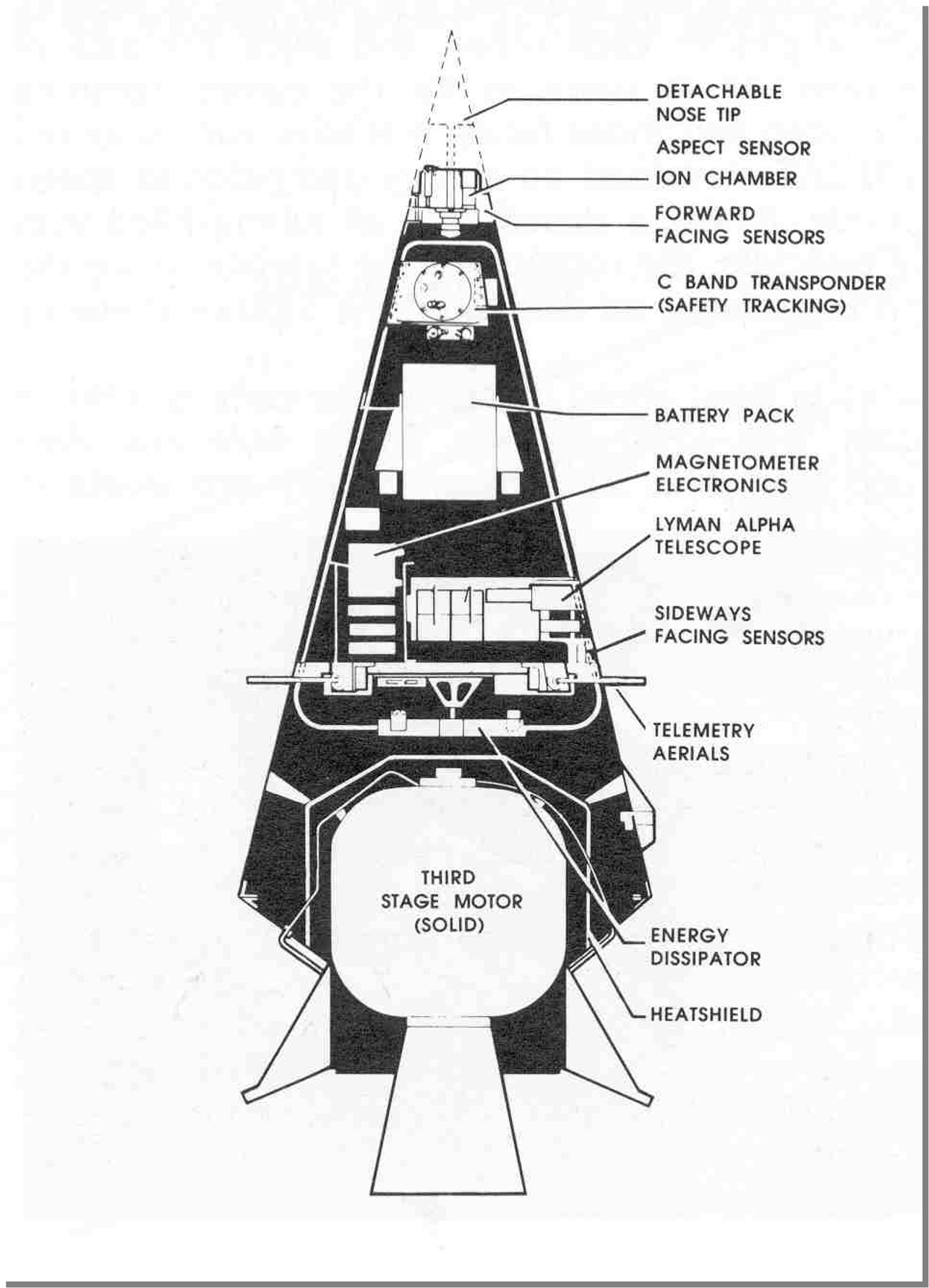
Diagram showing the internal layout of WRESAT’s systems and scientific instruments
Given the short development period, WRESAT’s scientific payload consists of instruments similar to those already flown in the Australian sounding rocket programme conducted in conjunction with the University of Adelaide Physics Department. The university team has developed a suite of instruments to study solar and ultra-violet radiation, atmospheric ozone and molecular oxygen density, as well as measuring the temperature of the solar atmosphere.
“Going Up From Down Under”
After an aborted launch attempt on the 28th, the Redstone lifted-off flawlessly on the 29th to place WRESAT into a polar orbit, where it is being tracked, and its telemetry signals recorded, by NASA’s Satellite Tracking and Data Acquisition Network – a service also generously provided free to Australia.

WRESAT soars on its way to orbit from Launch Area 8 at Woomera
Because of its short development time, a solar array could not be designed for WRESAT, and the satellite is only battery-powered. This means it will have a very short operational lifespan, but we expect it to gather a large amount of data on the upper atmosphere that will provide a check on the data already gathered by sounding rockets.
Let’s hope that WRESAT-1 marks the start of Australia’s true Space Age, and that this country will soon “shine as brightly as the Southern Cross”, as President Johnson has put it in his congratulatory telegram on our first national launch!
 </small
</small
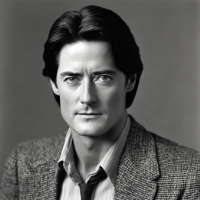


![[April 18, 1969] A new look at dragons… (Anne McCaffrey's <i>Dragonflight</i>)](https://galacticjourney.org/wp-content/uploads/2024/04/690418coverdragonflight-672x372.jpg)


![[December 31, 1967] Surprise, surprise! (January 1968 <i>Analog</i>)](https://galacticjourney.org/wp-content/uploads/2022/12/671231cover-669x372.jpg)










![[November 30, 1967] One door closes… (December 1967 <i>Analog</i> and Australia joins the Space Race!)](https://galacticjourney.org/wp-content/uploads/2022/11/671130cover-672x372.jpg)












![[September 30, 1967] Ain't that good news! (October 1967 <i>Analog</i>)](https://galacticjourney.org/wp-content/uploads/2022/09/670930cover-672x372.jpg)











